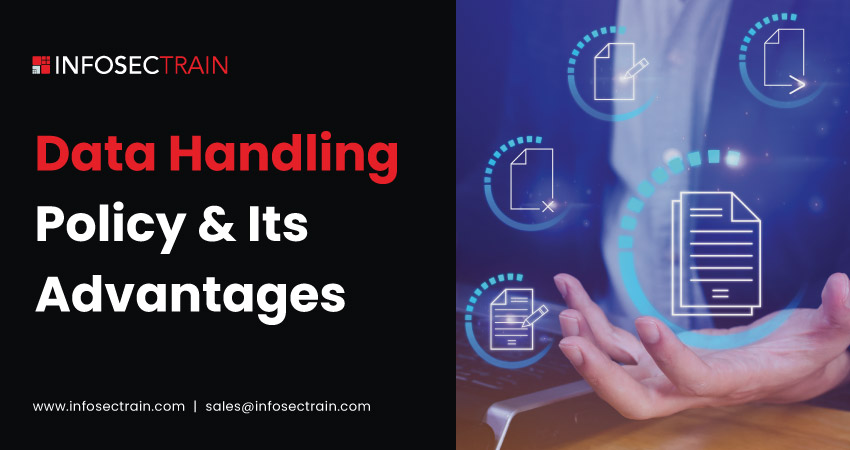Data Handling Policy & Its Advantages
Data has become a critical asset for organizations, central to driving innovation, operational efficiency, and growth. However, the value of data also brings significant responsibilities. Recent reports, including one from Gartner, predict that by 2025, 75% of the global population’s personal data will be covered by new privacy regulations, emphasizing the need for robust data handling policies. As data volumes grow, driven by technologies like AI and IoT, responsible data management is essential to mitigate risks and maintain trust. An effective data handling policy not only guarantees compliance with legal standards but also prepares organizations for continued success in a world where information is increasingly central to operations.

What is a Data Handling Policy?
A data handling policy comprises a set of guidelines and procedures that an organization adheres to for managing, protecting, and responsibly utilizing data. It specifies the methods for collecting, storing, accessing, sharing, and disposing of data to maintain its integrity, confidentiality, and availability. Essentially, a data handling policy serves as a roadmap, guiding organizations through the intricate aspects of data management and ensuring compliance with legal obligations and ethical principles.
Key Components of a Data Handling Policy
A comprehensive data handling policy typically includes several key components:
- Data Collection: Guidelines on how data should be collected, including the legal and ethical considerations involved. This ensures that only necessary data is collected and that it is obtained lawfully.
- Data Storage: Guidelines on securely storing data to prevent unauthorized access or breaches, such as employing encryption, utilizing secure servers, and conducting regular backups.
- Data Access: Procedures for controlling who can access the data and under what circumstances. This helps to prevent misuse or accidental exposure of sensitive information.
- Data Sharing: Policies on how data can be shared with third parties, including the need for data sharing agreements and ensuring that the recipients follow similar data protection standards.
- Data Disposal: Guidelines for the safe disposal of data that is no longer needed, ensuring that it cannot be recovered or misused.
- Compliance and Monitoring: Regular monitoring and audits to ensure that the data handling policy is being followed and is up-to-date with current regulations.
Why is a Data Handling Policy Important?
The importance of a data handling policy cannot be overstated. Here are some of the key advantages of having a robust data handling policy in place:
- Protects Sensitive Information: A data handling policy safeguards sensitive information from unauthorized access, breaches, and leaks. This includes personal data such as customer details, financial information, and proprietary business data. By implementing strict data handling procedures, organizations can safeguard this information from potential threats.
- Ensures Compliance with Legal Regulations: Many countries implement strict data protection laws, like the General Data Protection Regulation (GDPR) in the European Union, that outlines how data should be managed. A data handling policy ensures that an organization complies with these laws, thereby avoiding hefty fines and legal repercussions.
- Enhances Trust and Reputation: Trust is a crucial factor in any business relationship. When customers and partners know that an organization has a robust data handling policy, they are more likely to trust it with their information. This trust can enhance the organization’s reputation and lead to stronger customer loyalty and better business relationships.
- Prevents Data Breaches: Data breaches can have devastating consequences, including financial loss, reputational damage, and legal penalties. A well-implemented data handling policy can help prevent data breaches by ensuring that data is stored securely and accessed only by authorized personnel.
- Facilitates Efficient Data Management: A data handling policy provides a clear framework for managing data efficiently. This includes guidelines for organizing, storing, and retrieving data, which can help streamline operations and reduce the risk of data loss or corruption.
- Supports Ethical Data Use: As the emphasis on data ethics grows, organizations must manage data in a manner that honours an individual’s rights and privacy. A data handling policy ensures that data is used ethically and transparently, thereby promoting responsible data practices.
- Reduces Risk of Human Error: Human error is a common cause of data breaches and other data-related issues. By providing clear guidelines and procedures, a data handling policy can reduce the risk of human error and ensure that data is handled consistently and correctly.
- Improves Decision-Making: Accurate and reliable data is essential for making informed business decisions. A data handling policy helps ensure that data is collected, stored, and accessed in a way that maintains its accuracy and reliability, thereby supporting better decision-making.
Developing a Data Handling Policy: Best Practices
Creating an effective data handling policy requires careful planning and consideration. Here are some best practices to keep in mind:
- Assess Your Data Needs: Before developing a data handling policy, it’s important to assess your organization’s data needs. Identify what types of data you collect, how you use it, and what risks are associated with it. This will allow you to customize your policy to meet your specific requirements.
- Involve Key Stakeholders: Developing a data handling policy should be a collaborative effort. Involve key stakeholders, including legal, IT, and business teams, to ensure that the policy covers all aspects of data management and aligns with your organization’s goals.
- Keep it Simple and Clear: A data handling policy should be easy to understand and follow. Avoid using technical jargon or complex language, and ensure that the policy is clear and concise. This will ensure that all employees can comprehend and follow the policy effectively.
- Regularly Review and Update: Data management is an evolving field, and your data handling policy should evolve with it. Regularly review and revise your policy to keep it aligned with current laws and best practices.
- Provide Training and Awareness: A data handling policy is only effective if employees are aware of it and understand how to follow it. Offer ongoing training and awareness programs to ensure all employees are well-versed in the policy and understand their roles and responsibilities in data handling.
- Monitor Compliance: Regular monitoring and audits are essential to ensure that your data handling policy is being followed. Use tools and techniques such as data audits, access logs, and compliance checks to monitor adherence to the policy and identify any areas for improvement.
DPO Hands-on Training with InfosecTrain
Data is both a valuable asset and a potential liability. InfosecTrain’s DPO Hands-on Training course provides you with the essential skills to develop and implement data protection policies that safeguard sensitive information, ensure compliance with data protection laws, and maintain organizational trust. By mastering best practices in data governance and protection, you’ll mitigate risks, strengthen your organization’s reputation, and leverage data responsibly to drive success.
Enroll in DPO Hands-on Training with InfosecTrain to secure your data and lead your organization toward a safer, more compliant future.
TRAINING CALENDAR of Upcoming Batches For Data Protection Officer
| Start Date | End Date | Start - End Time | Batch Type | Training Mode | Batch Status | |
|---|---|---|---|---|---|---|
| 04-Aug-2025 | 19-Aug-2025 | 20:00 - 22:00 IST | Weekday | Online | [ Open ] |







 1800-843-7890 (India)
1800-843-7890 (India)